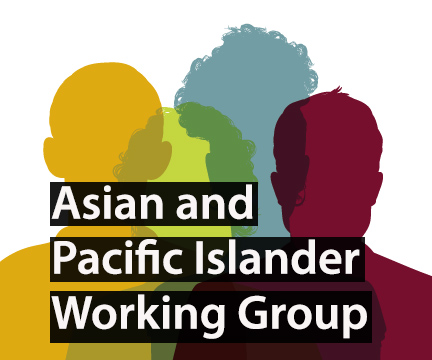As the university prepares to celebrate Asian heritage in April, a new effort is underway involving students, faculty and staff.
Elon University will create the Asian and Pacific Islander Working Group, a group of students, faculty and staff who will identify strategies and organize support for Asian and Pacific Islander (API) members of the community. “This work is important in response to the hurt that some students and colleagues are experiencing and the opportunity to create a more inclusive learning environment” said President Connie Ledoux Book. The groundwork for this effort began in fall 2019 as Elon anticipated growth in this community and saw the need to provide additional support.
In early 2020, prior to the start of the pandemic, Melody Harter, program assistant for the Center for Leadership and advisor to the Asian Pacific Student Association; Kiah Glenn, assistant director of the CREDE and point person for Asian and Pacific Islander student support; and Jooyun Hwang, assistant professor of strategic communications and Asian studies program coordinator put together some initial thoughts about the experiences of the API community at Elon. Glenn worked with Randy Williams, vice president and associate provost for inclusive excellence, to create a statement on the Ready & Resilient website and in a campus message from Vice President Jon Dooley condemning anti-Asian discrimination, racism and violence that has been on the rise across the country since the start of the pandemic.
In part, the statement read: “At Elon, we condemn anti-Asian bigotry, racism, xenophobia and other forms of oppression. Anti-Asian racism has no place here, and we address these acts when they appear. We fully reject the racialization of the COVID-19 pandemic, the framing of COVID-19 as a foreign attack on domestic soil and the association of nationality to the disease. These acts are inconsistent with our aspirations. Any act or expression of bias or bigotry should be reported to the Center for Equity and Inclusive Excellence. You can find out more about reporting on Elon’s Bias Response website.”
“We have followed up on the events of last summer with substantive dialogue and action,” said Williams. Dooley and Williams supervised and mentored Thida Kim ’21, an international student from Cambodia, in her executive internship project that resulted in a report examining the experiences of the API community in three sectors: the United States, Elon University, and Elon’s peer institutions. Kim’s report will be shared with the new API Working Group that will use the report findings to inform its study leading to recommendations to President Book.
“Working with several students, including some members of Elon’s Asian Pacific Student Association (APSA), we have been planning an expansion of our programs in support of this community,” stated Williams. “This effort is even more relevant and timely in the wake of the horrific murders in Atlanta on March 16.”
Elon expressed support for Asian-identifying students on its website and in social media posts by the university and President Book. Additional statements were issued by the School of Law, the School of Communications and the School of Health Sciences who condemned acts of hate against the API community. Shortly after the Atlanta murders, Williams and Glenn worked with students to organize a virtual campus forum on March 24, that was attended by more than 100 members of the campus community.
“I am merely but one voice from the API community,” said Kim, who helped organize the forum. “Share your stories and make them loud. We shall all be heard, and with your stories, we shall work together to ensure that the next waves of API students will not feel like they need to run home to seek a safe space.”
The forum also included remarks by newly elected SGA vice president Chloe Yoon ’22, President Book and several students, faculty and staff. The discussion was centered around how recent events have impacted members of the Elon community, how the university can build bridges across API communities and beyond API communities, and how we — individually, as a community and as a society — can move toward racial healing.
Earlier in the day, student members of the Diversity Committee of the School of Health Sciences invited fellow students, faculty and staff to the Francis Center for a thought-provoking discussion about the rise in anti-Asian violence. The “Diversi-tea” event brought the group together to listen, learn and hold a dialogue about a variety of topics affecting API communities. Participants gathered in an outdoor tent and took part in small-group conversations about a history of hatred, racism and violence toward the API community in America, as well as ways to address the issue.
The event was especially meaningful to Yuan Zhuang, a second-year doctor of physical therapy student from China. Zhuang admits to being fearful amid a rise in anti-Asian violence over the past year, but was encouraged to see a tent full of professors and fellow students ready to start a dialogue and offer support.
“I just feel really grateful that a lot of my professors and the students can come here and support,” Zhuang said. “They have a really deep understanding about what we are encountering right now and try to support us.”
Following these campus events, Williams has continued dialogue with Asian-identifying students and colleagues to identify strategies to raise awareness of their campus experiences and build a more inclusive and supportive campus environment. The new Asian and Pacific Islander Working Group is being constructed and will be announced later in April during a month of events related API heritage. For anyone seeking existing resources, consider Elon’s bias response system, Counseling Services, the CREDE, and the Division of Inclusive Excellence.
“We value and celebrate the diverse backgrounds, cultures, experiences and perspectives of all our community members,” President Book says. “We, therefore, stand in solidarity with the Asian and Pacific Islander community and against anti-Asian sentiments, remarks, behaviors and other expressions of bigotry. Further, we will take action with accountability to this community.”



